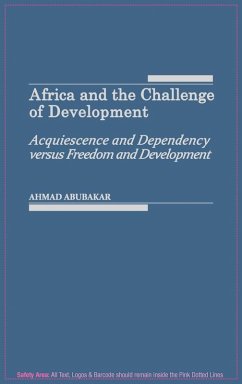Although much has been written about African development since the beginning of independence, officials in government have contributed very few studies directly involved in development work. This book fills that gap by providing a practically-oriented analysis of Africa's ongoing development problems. In contrast to most theoretical works which attempt to explain underdevelopment as the result of a lack of capital, manpower shortages, or colonial history, Abubakar proposes that Africa's development problems should be seen in terms of dependency and lack of capital, manpower shortages, or colonial history. He argues that Africa's development problems should be seen in terms of dependency and a lack of commitment to develop. He argues further that the African governments' attitudes toward development, which until now have not received adequate attention in the literature, are a crucial factor in explaining Africa's problems with underdevelopment. Abubakar asserts that while it is true that colonialism has contributed to underdevelopment, the colonial experience should cease to be a scapegoat for Africa's failure to develop. Similarly, he demonstrates that aid has never been a solid basis for African development. Based upon his extensive experience, Abubakar concludes that three things are necessary to solve Africa's economic problems: a concrete commitment to development on the part of African governments; a realistic effort to end dependence on the global economic system; and a people-oriented and self-reliant government strategy.
Hinweis: Dieser Artikel kann nur an eine deutsche Lieferadresse ausgeliefert werden.
Hinweis: Dieser Artikel kann nur an eine deutsche Lieferadresse ausgeliefert werden.








